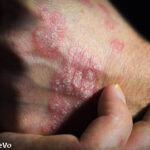(Reuters Health)—People with psoriasis, a chronic inflammatory disease, are more likely to have heart attacks and strokes when they have a family history of cardiovascular problems, a Danish study suggests.
Psoriasis wasn’t associated with higher risk of heart attacks or strokes when people with the skin condition didn’t have a family history of cardiovascular disease, the study found.
But when people with mild psoriasis and a family history of major adverse cardiac events, such as heart attacks and strokes, were compared with psoriasis sufferers without such a family history, their risk was 28% higher. With severe psoriasis and a family history of heart problems, the risk was 62% higher.
“It is generally believed that patients with psoriasis are at increased risk of cardiovascular disease due to the inflammatory nature of psoriasis,” says lead study author Dr. Alexander Egeberg of the University of Copenhagen.
“While psoriasis itself may still confer an independent cardiovascular risk compared with the general population, our findings suggest that there may exist a genetic predisposition for cardiovascular disease,” Egeberg adds by email.
To assess the link between psoriasis and a family history of heart disease, Egeberg and colleagues reviewed Danish data from 1997–2011 on more than 2.7 million people, including almost 27,000 individuals with mild psoriasis and about 4,500 with severe psoriasis.
At the start of the study, people were around 27 years old on average.
Approximately two-thirds of those with psoriasis in the study had a family history of cardiovascular disease, which was slightly more common with severe psoriasis than with mild psoriasis.
Without a family history of heart disease, the rate of major adverse cardiac events was 1.3 per 10,000 people per year among those who didn’t have psoriasis. That compared with 1.85 cases per 10,000 people per year with mild psoriasis and about 6 per 10,000 with severe psoriasis.
But after researchers adjusted for other factors that might influence the odds of heart attacks and strokes, they no longer found a difference between people with psoriasis and the general population when there was no family history of cardiovascular disease.
There was, however, a significant difference in the risk of heart attacks and strokes when people did have a family history of cardiovascular disease, the researchers report in the Journal of the American Academy of Dermatology.
With a family history, the incidence rates of cardiac events were about 18 per 10,000 people per year for the general population, 36 per 10,000 for mild psoriasis and 45 per 10,000 for severe psoriasis.

